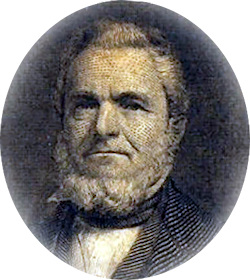Bank of the Republic,
New York, Feby. 9, 1861.
My Dear Sir: Notwithstanding I have no reply to any of my late letters to you, knowing your constant engagements I still write you.
The arms seized here have been put at the command of their owners—the question in dispute being the expenses, some 3 or 400 [dollars] lawyers’ fees, etc., between the owners of the vessel and the shippers and owners of the arms.
Gov. Brown ordered several N. York vessels seized yesterday in Sav’h, and I had a telegram to that effect this morning and immediately telegraphed to have the vessels relieved as the arms had been surrendered.
Col. Hayne has left Washington and from the tone of the correspondence there I fear an attack on Fort Sumter, which would be very disastrous if any blood be shed.
The Democratic Convention in Albany last week ([Mr. Lasitter?] was in it) has drawn the [line?] for peace with the South, and the cause of peace is gaining daily in the city and in the Country, and will soon sweep the Republicans into a minority, if there be no collisions or indiscretions at the South to give them aid or comfort.
Rome was not built in a day—a good Government cannot be organized and put into operation in a month. Better meanwhile to submit to evils and even to injustice, to bear and forbear, rather than to give offence to your friends here, and thus aid your enemies.
If the Republicans had shown any conciliatory disposition the past 2 months, they would have had twice the strength they now have. Their obstinacy has made secessionists at the South and sympathisers with them at the North.
The South should be careful not to imitate their example, but be prudent, deliberate and forbearing. All will be settled soon in that way.
But it is all important the Confederacy should take charge of the States so far as foreign relations are concerned, immediately—else diverse counsels will produce disastrous consequences in some way or other.
The exchange of the money found in the mint at N. Orleans would command the possession of Fort Sumter, Pickens, and at the Tortugas, and settle also a point favorably to the South as to the propriety of that seizure—which has alienated some opinions here. But that is not all—the Confederacy is to bear the brunt and should have the control of all such actions. It should negotiate anew for the forts in Charleston and elsewhere, and on all other points, and meantime S. Carolina and all other states should commit all action on such points to the Confederacy at once and forever. It is folly to proceed in any other way and will inevitably lead to danger and difficulty.
I do not like the export duty on cotton. Make direct taxation on the Georgia principle, and add to.it a tax on income (pretty strong), and with economy the New South will have ample means. Free Trade will command England and France as far as they are desirable, which is only as customers, after you secure a peace with the North. You will soon get all the slave states, and you ought to admit none other unless they will institute slavery. And no State or individual should be allowed to free a slave without the vote of 2/3ds [of] the Congress of the Confederacy, and then they should be removed beyond the limits.
Again I would call your attention to citizenship. None but those who are citizens now and who were or may be born within the bounds of the Confederacy should be citizens. The emigration from the North and East will overwhelm you within 3 years after peace, and control your government for you.
You don’t want treaties, only with the North, France, England and the German States. You need no Navy. But you should have an Army of 15 or 20,000 men to put on the northern line and to put in position within the States to keep the negroes in order.
Again I repeat, be careful to cause no irritation or provocation to the North. Submit to evils for a while and wait till they can be righted by negotiation. Bear and forbear.
From Annual Report of the American Historical Association for the Year 1911.
Gazaway Bugg Lamar (1798-1874) was an American merchant in cotton and shipping in Savannah, Georgia, and a steamboat pioneer. He was the first to use a prefabricated iron steamboat on local rivers, which was a commercial success. In 1846 he moved to New York City for business, where in 1850 he founded the Bank of the Republic on Wall Street and served as its president. He served both Southern businesses and state governments. After the start of the American Civil War, Lamar returned to Savannah, where he became active in banking and supporting the war effort in several ways. With associates, he founded the Importing and Exporting Company of Georgia, which operated blockade runners.
Lamar and Cobb were cousins by marriage.
Howell Cobb was an American political figure. A southern Democrat, Cobb was a five-term member of the United States House of Representatives and Speaker of the House from 1849 to 1851. He also served as the 40th Governor of Georgia and as a Secretary of the Treasury under President James Buchanan. Cobb is, however, probably best known as one of the founders of the Confederacy, having served as the President of the Provisional Congress of the Confederate States.
